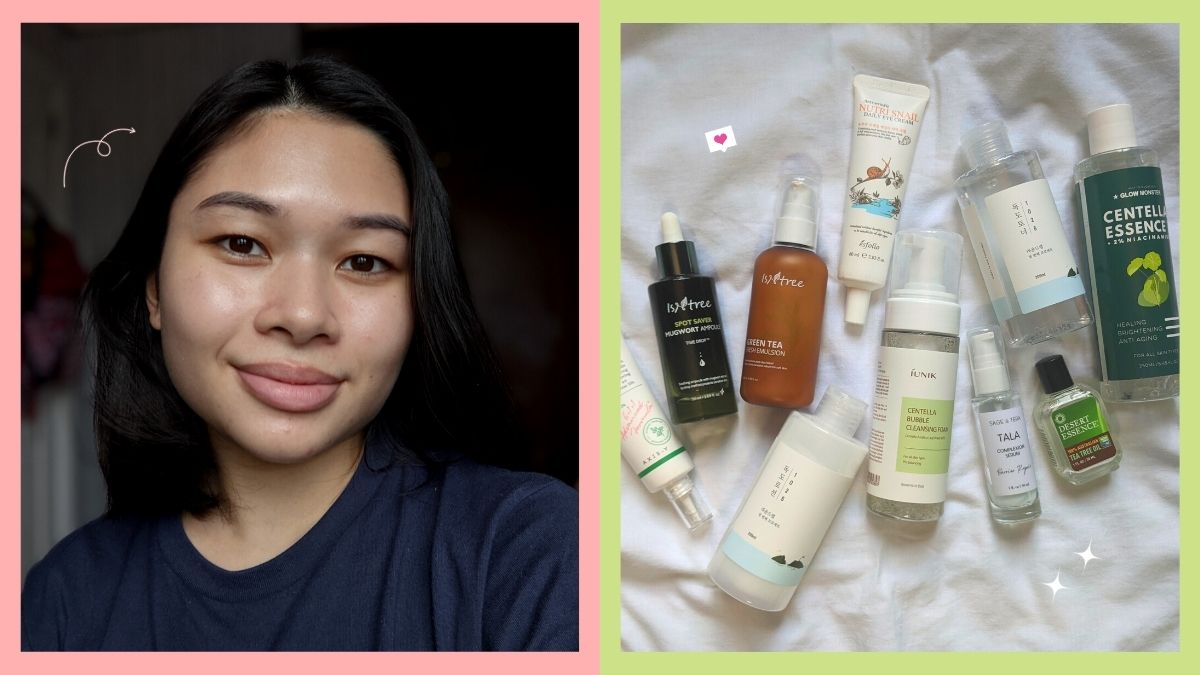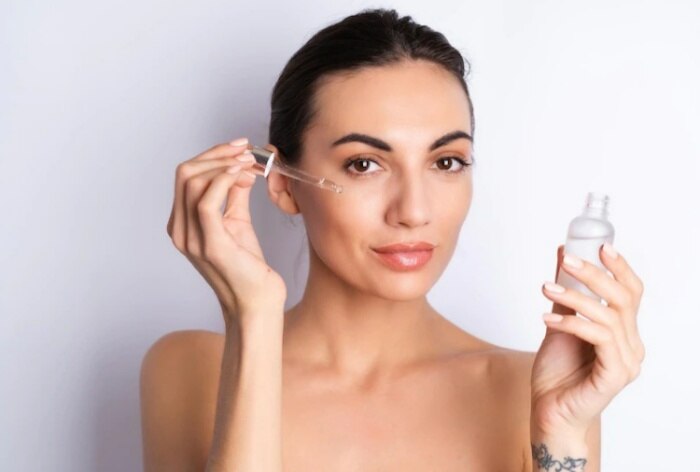Welcome to Beautylectual, the world of skincare! With our in-depth knowledge and experience, we understand the intricacies that come with the oily skin type. Oily skin is characterized by an overproduction of sebum, our skin’s natural oil. There are various factors at play when it comes to oily skin: hormonal changes, genetics, environmental elements, and more.
The impact of having oily skin goes beyond just appearance; it affects the overall skin health too. The surplus oil on your face can clog pores and lead to pesky acne breakouts. Moreover, it may hinder the effectiveness of your skincare products from reaching deeper layers of your skin. Understanding these crucial aspects allows us to develop a tailored skincare routine specifically for oily skin concerns. By addressing these issues head-on, we can effectively manage excess oil production and help you achieve healthier-looking skin that radiates confidence.
Keep reading our article to learn more and establish the best skincare regime for oily skin.
Contents
Discovering Your Skin Type
When it comes to creating a skincare routine that truly works for you, understanding your skin type is absolutely essential. If you have oily skin, it’s crucial to tailor your routine specifically to address the unique challenges and needs associated with excess oil production. In this section, we will explore why knowing your skin type is so important, provide simple steps to determine if you have oily skin, and highlight the common characteristics of this skin type.
Common Characteristics of Oily Skin:
- Excess oil production: Oily skin produces an abundance of natural oils called sebum which can lead to a shiny complexion even shortly after cleansing.
- Enlarged pores: The overproduction of sebum can cause pores to become enlarged and more visible, particularly on the nose, cheeks, and chin.
- Prone to acne: Oily skin is often associated with acne breakouts due to clogged pores caused by excess oil mixing with dead skin cells and bacteria.
- Makeup challenges: If your makeup tends to slide off or melt away quickly throughout the day, it could be a sign of oily skin as the excess oil disrupts product adherence.
Simple Steps to Determine If You Have Oily Skin:
- Pay attention to how shiny or greasy your face appears throughout the day. Oily skin tends to produce more sebum than normal or dry skin types, resulting in a constant sheen on the T-zone (forehead, nose, and chin).
- Take a closer look at the size of your pores in areas like the nose and cheeks. Oily skin often has visibly larger pores due to increased sebum production.
- If acne breakouts or blackheads are frequent occurrences for you—especially in areas prone to oiliness like the forehead or chin—it may indicate that you have oily skin.
In the next section, we will delve into why a tailored skincare routine is necessary for those with oily skin.
The Expert’s Guide to a Skincare Routine for Oily Skin
A well-crafted skincare routine plays a vital role in regulating the overproduction of oil. So, incorporating products that target excess sebum secretion without stripping away essential moisture is a must. A consistent skincare routine also keeps your pores clean and minimizes inflammation, effectively preventing pesky breakouts. Dealing with unwanted shine throughout the day is yet another challenge faced by individuals with oily skin. However, an effective skincare routine with mattifying products helps control the shine.
Taking care of oily skin goes beyond just managing oiliness; it also contributes to improving overall skin health. Using cleansers, toners, serums, moisturizers, and treatments enhances both the texture and appearance of your complexion.
Plus, neglecting or not following a proper skincare routine tailored for oily skin can have detrimental effects:
- Increased breakouts: Without regular cleansing and exfoliation, clogged pores become breeding grounds for bacteria, leading to increased acne breakouts.
- Dull complexion: Lack of proper hydration combined with inadequate exfoliation can result in a dull and lackluster complexion. Remember, even oily skin needs hydration! But it’s important to find the right balance by incorporating oil-control products into your routine.
- Uneven skin texture: Without consistent use of suitable skincare products, oily skin can develop an uneven texture due to the accumulation of dead skin cells and excess sebum.
Therefore, having a skincare routine tailored for oily skin is absolutely crucial if you want to maintain a healthy-looking complexion. By using the right combination of products that target oiliness, prevent breakouts, and improve overall skin health, you’ll achieve a balanced complexion that radiates confidence.

The Essential Components of an Expert Skincare Routine for Oily Skin
Maintaining a healthy and balanced complexion requires a skincare routine that is specifically tailored to oily skin. Here are the key components of an expert skincare routine for oily skin:
1. Cleansing:
- Begin your routine by washing your face twice a day, once in the morning and once at night.
- Look for a gentle cleanser that is specially formulated to treat oily or acne-prone skin.
- Avoid harsh cleansers that strip away too much oil, as this can actually stimulate more oil production.
- Gently massage the cleanser onto damp skin using circular motions, then rinse thoroughly with lukewarm water.
2. Toning:
- After cleansing, use a toner to further purify your skin and remove any remaining impurities.
- Choose toners that contain ingredients like witch hazel or salicylic acid, which effectively target oil production and minimize pore size.
- Apply the toner to a cotton pad and gently swipe it across your face, paying extra attention to areas prone to excess oil.
3. Exfoliating:
- Exfoliation plays a crucial role in removing dead skin cells that contribute to clogged pores and lackluster skin.
- Opt for chemical exfoliants containing alpha-hydroxy acids (AHAs) or beta-hydroxy acids (BHAs), as they are gentler on oily skin compared to physical scrubs.
- Use an exfoliant 2-3 times per week after cleansing but before applying other products.
4. Moisturizing:
- Contrary to popular belief, even oily skin needs proper hydration!
- Select lightweight moisturizers labeled “oil-free” or “non-comedogenic” to avoid clogging your pores.
- Look for moisturizers that contain ingredients like hyaluronic acid, which provide hydration without adding excess oil.
- Apply a thin layer of moisturizer after cleansing and toning, both in the morning and at night.
5. Sun Protection:
- Shielding your skin from harmful UV rays is essential, regardless of your skin type.
- Opt for oil-free or gel-based sunscreens with an SPF of 30 or higher.
- Apply sunscreen as the final step in your skincare routine every morning, even on cloudy days.
6. Spot Treatment:
- If you occasionally experience breakouts or have acne-prone skin, spot treatments can be highly effective.
- Seek out products containing ingredients like benzoyl peroxide or salicylic acid to directly target blemishes.
- Apply a small amount of spot treatment only onto affected areas, following the instructions provided by the product.
Remember that consistency is key when it comes to skincare routines. Follow these steps diligently and allow your skin time to adjust before expecting significant results. Additionally, always conduct patch tests on new products before incorporating them into your routine to ensure they do not cause any adverse reactions.
By adhering to this expertly crafted skincare routine specifically designed for oily skin types, you can effectively treat excess oil production while maintaining a healthy and radiant complexion.

Expert Tips on Choosing the Perfect Skincare Products for Oily Skin
To achieve balanced, radiant skin, choosing the right products is crucial. The wrong ones can aggravate oiliness and cause annoying breakouts, but the best options can work miracles in restoring harmony to your complexion. As skincare experts, we’re here to help you navigate this decision-making journey with these vital factors:
1. Opt for Oil-Free or Non-Comedogenic Formulas
These specialized products are specifically formulated to prevent pore-clogging and excess oil production. They allow your skin to breathe freely while providing much-needed hydration.
2. Embrace Lightweight Textures
Heavy creams and thick lotions may feel too greasy on oily skin, leaving you feeling uncomfortable throughout the day. Instead, go for lightweight gels, serums, or water-based moisturizers that absorb quickly without any residue.
3. Harness the Power of Sebum Regulation Ingredients
Certain ingredients have been proven effective in controlling sebum production in oily skin types. Look out for products containing salicylic acid, niacinamide, tea tree oil, witch hazel, or clay (such as bentonite), as they effectively target excess sebum.
4. Avoid Harsh or Drying Ingredients
While it might be tempting to use strong cleansers or toners that strip away all traces of oil from your face, this can actually backfire by triggering even more oil production as your skin tries to compensate for dryness. Instead, choose gentle cleansers with mild surfactants and alcohol-free toners.
5. Scrutinize Product Labels Carefully
Some skincare products marketed towards oily skin may contain hidden irritants like fragrances or essential oils that could potentially aggravate inflammation and cause more breakouts—especially if you have sensitive skin.
6. Seek Professional Advice When in Doubt
If you’re unsure about which specific products would work best for your oily skin type, it’s always a wise decision to consult with a dermatologist. They possess the expertise and knowledge of different brands and formulations to provide personalized recommendations tailored to your unique needs.
Remember, finding the perfect skincare routine for your oily skin may require some trial and error. What works wonders for one person might not yield the same results for another. So be patient, stay persistent, and don’t get discouraged if you don’t see immediate changes.
Mastering Your Skincare Routine for Oily Skin
Achieving clear, balanced skin is within your reach when you maintain a consistent skincare routine tailored to oily skin. We’re here to guide you through the essential tips and tricks that will help you achieve long-lasting results.
The Power of Consistency:
- Consistency is key when it comes to treating oily skin. By diligently following your skincare routine, you allow the products to work their magic and effectively regulate oil production.
- Skipping steps or neglecting your routine can disrupt the delicate balance of your skin, leading to increased oiliness, breakouts, and other frustrating issues.
Incorporating Your Routine Into Daily Life:
- Set aside dedicated time in both your morning and evening routines solely for taking care of your precious skin. This commitment will establish consistency as second nature.
- Organize your skincare products in a way that makes them easily accessible so that using them becomes effortless and enjoyable.
- If you feel overwhelmed by too many steps or products, simplify your routine by focusing on the essentials that deliver maximum impact.
Remember that every individual’s skin is unique; what works wonders for one person may not yield the same results for another. It’s crucial to listen attentively to how YOUR own skin responds and make adjustments accordingly.
By mastering a consistent skincare routine specifically designed for oily skin types, excess oil will be kept at bay while promoting an overall healthier and more radiant complexion.
Seeking Expert Advice from a Dermatologist
Transform your skin journey with the guidance of a skilled dermatologist. These experts possess the knowledge and expertise to provide tailored recommendations for your unique needs. Discover why consulting a dermatologist is essential:
- Accurate diagnosis: Uncover your skin type and identify any underlying conditions contributing to oily skin.
- Customized treatment plans: Experience personalized solutions that target your concerns and goals.
- Access to prescription medications: Unlock the power of effective prescriptions and topical treatments, surpassing over-the-counter products.
- Expert advice: Receive valuable insights on skin care routines, product recommendations, and lifestyle changes that enhance both health and appearance.
- Monitoring skin health: Regular visits allow for ongoing monitoring, ensuring early detection of potential issues.
Your partner in achieving radiant, healthy skin awaits. Embrace their expertise today to optimize your routine and address all concerns head-on.
Follow our tips and tricks, don’t hesitate to reach out if you need any help, and stay healthy!
